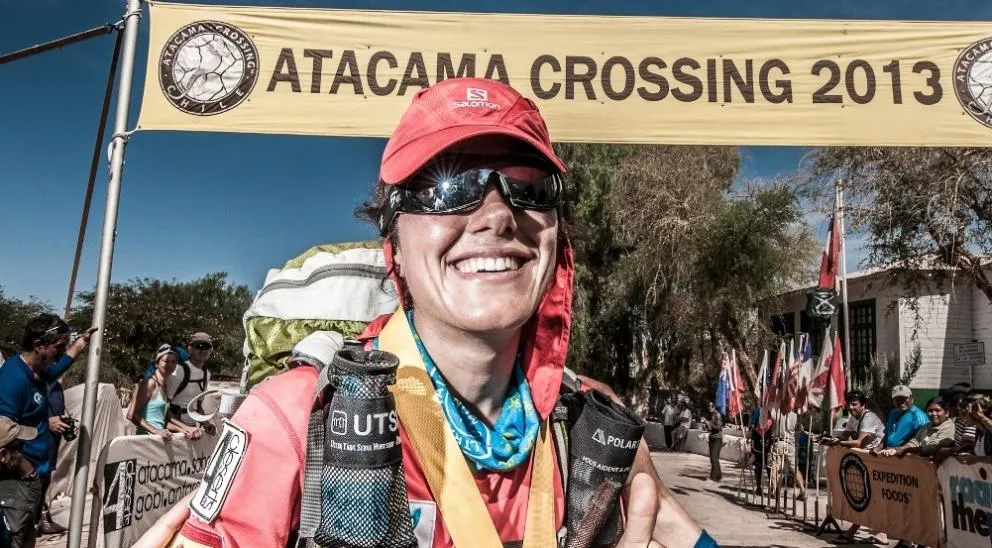Beatriz García Berché (Barcelona, 1981) has just returned from Antarctica, after completing the challenge of the 4 deserts.He has done so in the last two years, in 2013 he played those of Atacama (Chile) and Gobi (China) and in 2014, Sahara (Egypt) and Antarctica.
In total, 250 kilometers in each of them that have led this Catalan to become the only Spanish woman to have achieved it, but also, her achievement goes further, she has done it with her illness in tow, diabetes.
"I saw it impossible, but in the end, you get everything you dedicate to effort," he still recognizes with emotion to El Confidencial.Beatriz combines his careers with his profession, he is a journalist on TV3.It leads a very busy life but its short -term intentions is clear: "I want to continue enjoying and competing everything that allows me life."
He is returning to reality, to his work and adapting again to the schedules, Beatriz García has just returned from Antarctica, where he completed the challenge of the 4deserts ending the second in girls.“I was not looking for a brand.For me the goal was to enjoy it and finish it, ”he acknowledges.The Catalan athlete explains how the last two years of her life have been: “They have been two super intense years.When I raised it I saw it impossible.When I found the resources to go, treatments with my dietitian began to know what I should carry in the backpack to survive seven days in a self -sufficiency race.I didn't know how diabetes was going to react as it was such great wear for so many days.In the first desert, in addition to having very hard weather conditions, I wore the second backpack with more weight, I thought it was not going to end.In the end I got it, then I already adjusted the weight, I already knew what I needed for my diabetes and I already had something more similar to the rest. ”
For Bea García, his backpack has been a fundamental part of achieving this challenge.“In my backpack I carry the diabetes, glucometers, insulin kit… I usually carry it in duplicate in very long races and then many supplements, bars, gels and food.There are people who give a ‘bird’, take two or three gels and voila, but in my case if you do not serve as you have to attend you you can pass out and lose knowledge.It is more difficult to assume than for any other runner, ”he says.Although the backpack is indispensable for Bea, it also marks the differences with the rest of the participants: “The main difference is the weight and material that I have to carry.I can't consider a race thinking ‘I make a fast backpack with a thermal blanket and a window and run’.I have to think that I have to bring food, quality material, the necessary elements to measure diabetes, etc.I have to go to the mountain knowing that I am self -sufficient. ”
Bea García is not afraid of his illness and also encourages other diabetics to practice sport without any fear: “First you must know yourself well, obviously you cannot take your doctor to the race, and analyze yourSensationsMake very gradual training and go little by little.Once you do this, with the necessary material to control your diabetes and thinking that it is not impossible to do so, you can do what you propose.With diabetes everything can be done, but you must carry much more thorough control than any other athlete.You have to look good and you can't go to adventure, you always have to go with knowledge and precautionary measures. ”

During the 4DESERTS challenge, Bea did not encounter problems with diabetes, although he did have more caution when facing complications in careers: “I have had derived problems or associated with diabetes.In addition to the weight of theBackpack in the first desert, in the second, I was wrong with footwear and I had feet wounds.Being diabetic I could give me infections and if the wounds went to more I would have to leave.It was not something that went through diabetes, but because I was wrong with shoes, but that diabetes made that more important.In the end, the blisters remained the same and they did not go worse, although they hurt a lot, I could continue.Luckily, neither in the third nor in the room, which was the most climatologically unknown, I had any problem. ”
Although Bea is a passionate about sport, her running adventure began in 2006 when she was fond of running after having practiced skiing.Since then he has not stopped adding kilometers to his legs: “I started with popular races, but I always liked the mountain.Through mountaineering I discovered it in its purest version.When you join the races and the mountain it is a perfect combination.In 2007, I participated in my first long distance race and that was when I discovered that I really liked it.It was a bit my philosophy of life, everything you dedicate to effort in the end you get it and it is a bit what is long distance. ”This Catalan explains what this type of careers mean to her: “This is not running, many people who are very good running at 10 or 15 hours for.It is not just running, it is a sport that is much more than running, it is more mental than physical. ”


